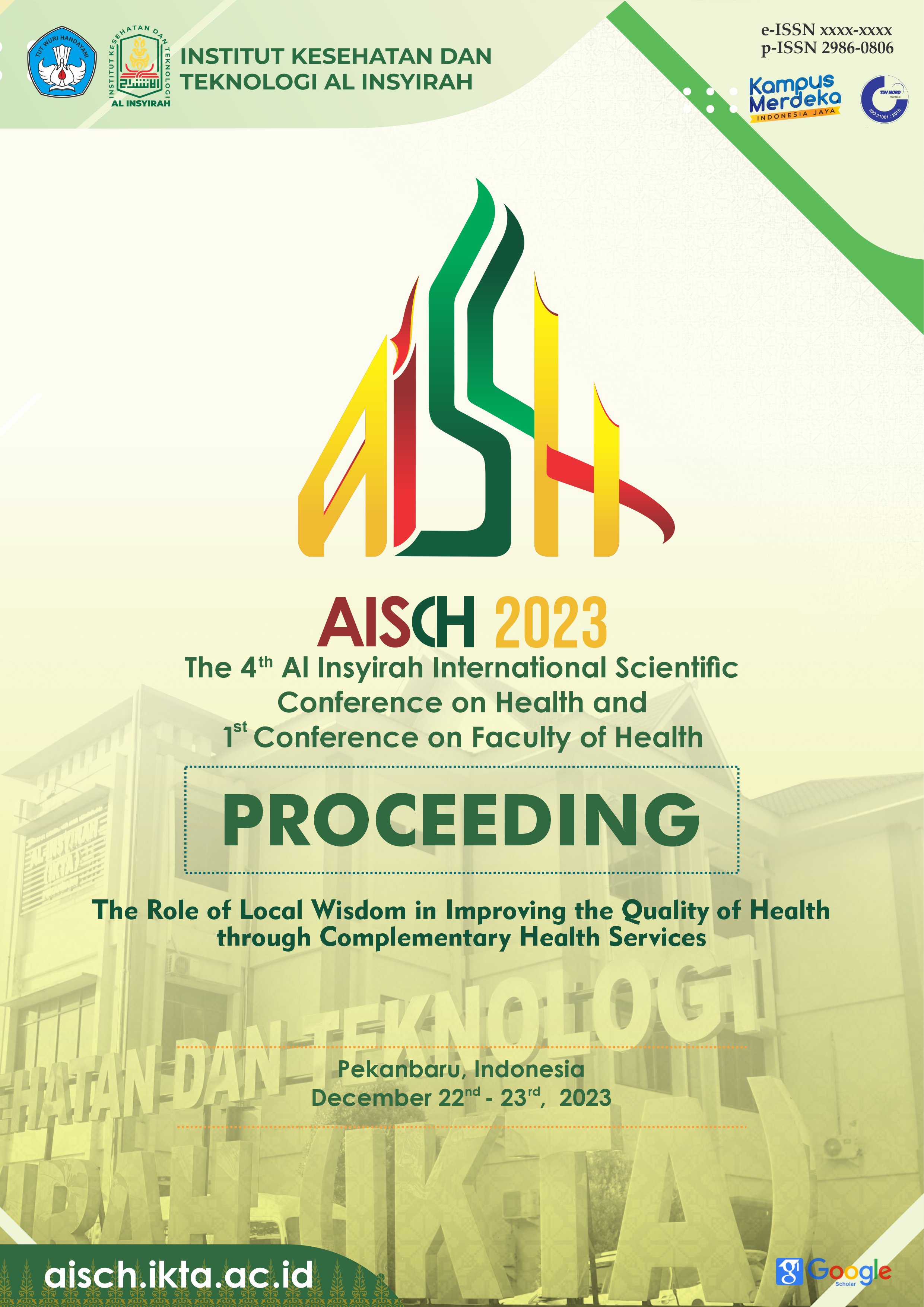BARRIER FACTORS IN REDUCING UNMET NEED FOR FAMILY PLANNING IN BENGKALIS REGENCY, INDONESIA
Keywords:
Unmet Need, Family Planning, Bengkalis RegencyAbstract
Backgrounds. The Family Planning (FP) program is an effort to reduce the rate of population growth in Indonesia. However, the unmet need for family planning is still high at 25.6% (national target is 5%). Objective. To identification of barriers factors for reducing Unmet Need for family planning. Method. It was qualitative research uses a phenomenological design. There were 13 informants involved in collecting data through in-depth interviews. The research was conducted in the Air Jamban Village, Bengkalis Regency for 3 months. Data analysis uses content analysis, while data validity uses triangulation method. Results. There are 47.2% of the population with low education, there is a prohibition on family planning for there religions and local customs. the wife is unable to make decisions, There are still myths about the number of children bringing fortune, limited family planning field instructors, access to health services, administrative data systems dissintegrated. Conclusion A low level of education can influence people's perception of this family planning program. Suggestion. There is a need to increase socialization and health education about family planning by using social media ex: Instagram, youtube etc.
Downloads
References
Worku SA, Mittiku YM, Wubetu AD. Unmet need for family planning in Ethiopia and its association with occupational status of women and discussion to her partner: a systematic review and meta-analysis. Contracept Reprod Med. 2020;5(1):21. Published 2020 Nov 20. doi:10.1186/s40834-020-00121-w
Shifa GT, Kondale M. High unmet need for family planning and factors contributing to it in southern Ethiopia: A community-based cross-sectional study. Global Journal of Medical Research. 2014;14:20–32.
Tegegn M, Arefaynie M, Tiruye TY. Unmet need for modern contraceptives and associated factors among women in the extended postpartum period in Dessie town, Ethiopia. Contracept Reprod Med. 2017;2(1):21. doi: 10.1186/s40834-017-0048-3.
BPS Statostic Indonesia. Percentage of Unmet Need KB (Family Planning Needs / Unfulfilled Family Planning) by Province. 2021.
Kementerian Kesehatan Republik Indonesia Laporan Nasional Riskesdas 2018. Lembaga Penerbit Badan Penelitian dan Pengembangan Kesehatan (2019)
Genet E, Abeje G, Ejigu T. Determinants of unmet need for family planning among currently married women in Dangila town administration, Awi zone, Amhara regional state; a cross sectional study. Reprod Health. 2015;12(1):1-5
Mekonnen, W., & Worku, A. Determinants of low family planning use and high unmet need in Butajira District, South Central Ethiopia. Reproductive health, 2011;1-8. https://doi.org/10.1186/1742-4755-8-37
Dejenu G, Ayichiluhm M, Abajobir AA. Prevalence and associated factors of unmet need for family planning among married women in Enemay District, Northwest Ethiopia: a comparative cross-sectional study. Global J Med Res.2013;13(4).22-32
Mota K, Reddy S, Getachew B. Unmet need of long-acting and permanent family planning methods among women in the reproductive age group in shashemene town, Oromia region, Ethiopia: a cross sectional study. BMC Womens Health. 2015;15(1):1-8.
Worku SA, Ahmed SM, Mulushewa TF. Unmet need for family planning andits associated factor among women of reproductive age in Debre Berhantown, Amhara, Ethiopia. BMC research notes. 2019;12(1):143, 1-6
Worku, S. A., Mittiku, Y. M., & Wubetu, A. D. Unmet need for family planning in Ethiopia and its association with occupational status of women and discussion to her partner: a systematic review and metaanalysis. Contraception and reproductive medicine, 2020;5(1), 21. https://doi.org/10.1186/s40834-020-00121-w
Gebre G, Birhan N, Gebreslasie K. Prevalence and factors associated with unmet need for family planning among the currently married reproductive age women in Shire-Enda-Slassie, Northern West of Tigray, Ethiopia 2015: a community based cross-sectional study. Pan Afr Med J. 2016;23(1):1–9
BKKBN. Keluarga Berencana dan Kontrasepsi. Jakarta: Pustaka Sinar Harapan (2018)
Safitri, F, Kana, I, Determinan Kejadian Unmet Need KB Di Wilayah Kerja Puskesmas Peukan Bada Kabupaten Aceh Besar Tahun 2019. Journal of Healthcare Technology and Medicine Vol. 5 No. 2 Oktober 2019;210-221. Universitas Ubudiyah Indonesia
Novera, S. Faktor-Faktor Yang Mempengaruhi Kejadian Unmet Need Keluarga Berencana Pada Wanita Usia Subur Di Kota Yogyakarta Tahun 2017. Skripsi. Prodi Sarjana Terapan Kebidanan Jurusan Kebidanan Politeknik Kesehatan Kementerian Kesehatan. 2018
Ardhika MU. Faktor Penyebab Terjadinya Unmet Need KB Pasangan Usia Subur (PUS) Di Kecamatan Labuhan Ratu Kota Bandar Lampung. Fak Kegur dan Ilmu Pendidik Universitas Lampung Bandar Lampung. 2018;Vol;10 (2).
Nzokirishaka A, Itua I. Determinants of unmet need for family planning among married women of reproductive age in Burundi: a cross-sectional study. Contracept Reprod Med. 2018;3(1):11.
Bakibinga P, Mutombo N, Mukiira C, Kamande E, Ezeh A, Muga R. The Influence of Religion and Ethnicity on Family Planning Approval: A Case for Women in Rural Western Kenya. J Relig Health. 2016;55(1):192–205
Khalil, SN., Alzahrani, MM., & Siddiqui, AF. Unmet Need and Demand for Family Planning among Married Women of Abha, Aseer Region in Saudi Arabia. Middle East Fertility Society Journal, 2018;vol.23, no. 1, pp. 31–36
Hartini. Pandangan Tokoh Agama Dan Budaya Masyarakat Terhadap Pemakaian Alat Kontrasepsi. Egalita J Kesetaraan dan Keadilan Gend, 2011;VI(2):pp;142–154
Dwi Santi Violentina Y, Yetti H, Amir A. Analisis Karakteristik Wanita Usia Subur, Dukungan Suami, dan Peran Bidan terhadap Unmet Need Keluarga Berencana di Wilayah Kerja Puskesmas Bungus Kota Padang. J Kesehat Andalas. 2020; pp;8(4).
Dal, N. A., & Beydağ, K. D. (2021). Attitudes of Married Muslim Women Regarding Family Planning Methods During the COVID-19 Pandemic in Western Turkey. Journal of Religion and Health, 60(5), 3394–3405. https://doi.org/10.1007/s10943-021-01387-3
Tadesse D, Medhin G, Kassie GM, et al. Unmet need for family planning among rural married women in Ethiopia: What is the role of the health extension program in reducing unmet need?. Reprod Health. 2022;19(1):15. Published 2022 Jan 21. doi:10.1186/s12978-022-01324-x
Teklu A, Yimam H, Medhin G, Tesfay TG. Competency of level-4 health extension workers to provide long acting reversible contraceptives: a task shifting initiative in Ethiopia. 2019;1–15
Ouma S, Turyasima M, Acca H, et al. Obstacles to family planning use among rural women in atiak health center iv, amuru district, northern Uganda. East Afr Med J. 2015;92(8):394-400.
Downloads
Published
Issue
Section
License
Copyright (c) 2024 Al Insyirah International Scientific Conference on Health

This work is licensed under a Creative Commons Attribution 4.0 International License.


